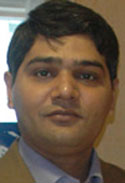
By Muhammad Amir Rana
26 July, 2015
STATES and societies are struggling to find ways to deal with religion — or religious thought, to be precise. While most states see religion as a challenge, for the common man the attraction of religion is increasing. However, this attraction is not uniform as religion is also losing appeal in many parts of the world.
The question of religion is more critical for Muslim societies which account for about 24pc of the world population. In many Muslim countries, religion has taken over policy discourse and religiosity is increasing among the masses. Religion has also become an important question for Western countries, especially for those that have sizable Muslim populations.
There are two aspects of the religion of Islam that worry the West: the so-called militant Islam and political Islam. The power elites and the majority of the intelligentsia in Muslim countries have little concern in terms of the rise of religious power in their countries. The West, too, seems ready to compromise on the narratives of political Islam as long as it helps control or counter militant tendencies among Muslim communities living there. Many Western countries see no harm if a few hundred among the tiny Muslim minorities hold radical political views.
However, they see political Islam as a problem in Muslim countries, mainly on two accounts. First, they think, radical political tendencies can easily transform into militant tendencies in Muslim majority states. Second, the West does not feel comfortable in dealing with Islamists when they come into power. The latest example was the Muslim Brotherhood government in Egypt.
The real concern of the West is violent religious extremism. These countries are confused about how to accommodate religion in their counter extremism strategies. ‘Less religion or more religion’ remains a critical question in the processes of policy formation in Western countries, which have so far failed to understand the dynamics of religious as well as extremist tendencies among Muslim immigrant communities.
The worry is that that these Western approaches, which have a completely different context, inspire power and social elites in Muslim countries and in many cases the latter blindly follow such approaches. The nature and challenge of violent extremism in Muslim countries are different from those facing the West.
For Muslim societies, the major challenge is the increasing influence of religion among the common people. This influence, or religiosity, may not necessarily lead individuals to violence or make them vulnerable to political Islam. Religion is mainly transforming Muslim societies, and a religious-socialisation process is shaping the behaviour of Muslim urban classes. Religiosity always connects a person with a broader religious discourse. Religiosity itself is a neutral phenomenon but within religious discourse, certain actors exploit the religious sentiments of the people for their individual or group interests. Managing these actors is a major challenge in Muslim societies. These religious actors could be radical or non-radical, but both could be the exploiters of religiosity.
In Pakistan, the power elites are scared of touching religious issues. Religious actors are largely considered part of the problem, but they should also be considered part of the solution. The power elites do not have connectivity with moderate religious scholars in society, and their views about religious communities and narratives are based on their interaction and working relationship with the leaderships of religious political parties. These parties do not necessarily represent moderate voices in religious discourse. A few such moderate voices might be found in religious political parties, but they do not have a major impact on party policies.
The religious elites are not responding to the challenges state and society are facing. As a result, radical narratives are strengthened, and constitutional, legal, and educational issues are becoming more and more complex. Pakistan and other Muslim countries cannot afford the subversion of their respective constitutions as the social imbalances and rise of violent and non-violent radicalism can completely transform the situation, which the radicals have shown they can achieve without paying a high price.
Many of the counter extremism programmes in the West also focus on the countries of origin of immigrant communities, with the assumption that fixing extremism in immigrants’ native lands will help prevent extremism in host societies. Western nations try to export their models to Muslim countries and think these will be effective in Muslim majority countries as well. The Western nations engage the religious scholars of immigrants’ native countries. It has been witnessed that those who have been engaged by the West were part of the religious elites. The engagement further empowers them, and they make religious discourse more complex.
For the West it is a community issue, but for Muslim countries it becomes a bigger challenge, as the religious elite wants to transform the whole system, the socio-cultural pattern, in a way which helps to make them stakeholders in power-sharing.
How can Muslim countries deal with religion and religious actors? Egypt is trying to manage political Islamists through making an alliance with the Salafis. Saudi Arabia and Iran are playing the most dangerous game: both countries are exploiting sectarian tendencies and trying to achieve their strategic objectives through proxies here and there. Interestingly, most of the Arab states feel more comfortable with the militants’ forces, as compared to the Islamists. It’s an easy choice for Muslim rulers, who want to maintain the status quo, as the militants demand only resources while the Islamists want regime change.
Muhammad Amir Rana is a security analyst.
Source: http://www.dawn.com/news/1196383/less-religion-more-religion




 Moderate Islamist here
Moderate Islamist here


0 comments:
Post a Comment